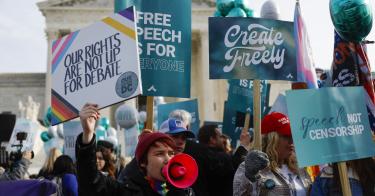In a recent opinion piece, a professor at Northwestern’s Pritzker School of Law lamented that religious freedom has become an excuse to break the law. Nothing could be further from the truth.
The First Amendment protects Americans from being compelled to violate their faith in word or deed. That’s Constitutional Law 101.
Until recently, however, scholars and jurists have largely focused on religious speech while ignoring the robust protections the First Amendment affords to religious deeds too.
But that’s starting to change. Increasingly, the U.S. Supreme Court has recognized that the First Amendment doesn’t just protect freedom of belief. It also protects the freedom to exercise one’s religious beliefs.
And as the Framers and ratifiers of the First Amendment understood, free exercise is more than what a person does in a house of worship. It encompasses all aspects of life.
Sadly, it’s no surprise to see novel arguments for curtailing religious freedom. Like in centuries past, animus still rears its ugly head against those who hold religious beliefs that are not in vogue—though only a few years ago many of these same beliefs would have been considered mainstream.
When hearts and minds remain unpersuaded to adopt the beliefs of the day, mainstream advocates have reframed disagreement as discrimination and dialogue as hate. Even the long-protected right to speak—or not to speak—on religious topics has come under attack.
But again, as the Supreme Court recently explained in 303 Creative v. Elenis, the First Amendment prohibits governments from compelling ideological conformity. After all, it’s not discrimination for someone to refuse to speak a message with which they disagree.
This basic tenet of constitutional law poses a problem, however, for those who want to enforce ideological homogeneity. Perhaps that’s why the Northwestern law professor didn’t really discuss the First Amendment in his recent op-ed, and why others are so troubled by the Supreme Court’s recent litany of decisions protecting free speech (including the right not to speak) and religious freedom.
Maybe they are troubled by the notion that a football coach can pray in public or that Americans are free to hold differing views on gender identity and sexuality. But those disagreements do not change the law.
Contrary to its critics’ assertions, the Supreme Court is not placing a thumb on the scale for religious claims and allowing litigants “to use religion as a pretense to break the law.” On the contrary, the court is simply following the highest positive law in our land: the U.S. Constitution, which protects against restrictive government action even in times of crisis like a pandemic or war—including when that action enjoys popular support.
This fundamental notion is why so many lawyers and scholars—and more recently, at least four current justices—have been critical of the court’s 1990 decision in Employment Division v. Smith, which permitted the government to prohibit or restrict religious practices so long as the government does so through a generally applicable law that is neutrally applied.
>>> The Constitution Allows a Level Playing Field, but Not a Rigged Game
Indeed, the Smith decision was so hotly debated that a bipartisan majority in Congress passed the Religious Freedom Restoration Act, which President Bill Clinton signed into law, to protect religious freedom RFRA reflected what the First Amendment said all along: The government can’t just trample on religious freedom under the fig leaf of neutrally enforcing a generally applicable law.
Of course, this law and others like it have also come under fire from those who favor ideological conformity over religious freedom. But the First Amendment, RFRA, and similar laws exist to protect beliefs that some, perhaps even many, might find disagreeable.
That’s good news for everyone, especially religious minorities. The vast majority of human history has featured persecution of religious groups who, because of their faith, lived differently from most of the society around them.
Recognizing that history, our fledgling nation chose a better course and enshrined the free exercise of religion as one of our first freedoms.
America has been a refuge for those who endured religious persecution precisely because the law does not condition religious freedom on a ruling party’s will or the whims of popular opinion. The court’s recent decisions rightly recognize that religious freedom is not a second-class right and are returning religious liberty to its proper, preferential place.
Religious freedom isn’t an excuse to break the law. It is a right enshrined in our nation’s highest law.
And when courts uphold that right, they uphold the law. That’s something we should celebrate, for ourselves and for the oppressed who look to our nation for refuge.
This piece originally appeared in The Washington Times




